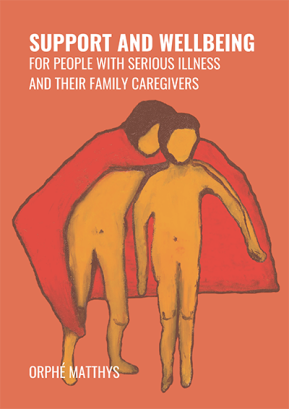Author: Orphé Matthys
Date: 13-05-2024
Supervisors:
Prof. Luc Deliens, End-of-Life Care Research Group, Universiteit Gent
Dr. Sigrid Dierickx (External)
Prof. Joachim Cohen, End-of-Life Care Research Group, Vrije Universiteit Brussel
Prof. dr. Aline de Vleminck, End-of-Life Care Research Group, Vrije Universiteit Brussel
Abstract
Background and aim
A serious illness such as advanced cancer not only affects the patient's quality of life but also profoundly impacts family caregivers. Both experience high unmet support needs, making psychoeducational interventions crucial. These interventions, like the FOCUS program, aim to equip patients and caregivers with coping strategies, information, and emotional support. The FOCUS intervention, offered face-to-face or online, addresses key areas including family involvement, optimism, coping, uncertainty, and symptom management. Developed by Northouse and colleagues, it involves three home visits over three months, tailored to each dyad's needs. While proven effective in the US, its impact in Europe remains to be seen. This dissertation aims to fill gaps in understanding end-of-life care dynamics, particularly the role of family caregivers and the effectiveness of two psychoeducational interventions. Current studies often lack sample size and effectiveness clarity, prompting the DIAdIC trial across six countries. This multisite trial aims to provide tailored support, addressing the specific needs of patient-caregiver dyads, ultimately enhancing their wellbeing.
The main objective of this dissertation is to investigate the support and wellbeing for patients coping with serious illness and their family caregivers.
Summary
In a comprehensive survey study involving 1,334 respondents, it was revealed that family caregivers play a crucial role in various caregiving activities for individuals with advanced cancer. These activities include ensuring safe mobility, providing emotional support, facilitating social interaction, assisting with administration, offering physical comfort, and managing symptoms. Remarkably, family caregivers reported receiving adequate support across physical, psychosocial, and practical dimensions, particularly when utilizing specialized palliative care services.
Furthermore, the survey explored the collaboration between family caregivers and healthcare professionals, with results showing that most family caregivers viewed their collaboration positively. This positive collaboration was linked to better emotional well-being post-bereavement.
Building upon these findings, a randomized controlled trial was conducted across multiple European countries to evaluate two psychoeducational interventions, namely FOCUS+ and iFOCUS, for patients with advanced cancer and their family caregivers. These interventions aimed to address coping strategies, symptom management, and family involvement, with emotional functioning and self-efficacy as primary outcomes.
Additionally, baseline data from the trial explored the topic of sexual satisfaction among patients and caregivers, revealing lower satisfaction levels, influenced by factors such as cancer type, caregiver relationship, and emotional functioning. The findings also underscored the taboo surrounding sexual satisfaction within the oncology population.
Notably, the trial demonstrated that the FOCUS+ intervention effectively improved patient self-efficacy compared to the control group at 12 weeks. However, the iFOCUS intervention did not significantly impact emotional functioning or self-efficacy for patients or caregivers. The positive effect of FOCUS+ on patient self-efficacy suggests potential benefits for family caregivers in other areas as well, although the web-based version of the intervention appeared less promising.


